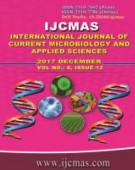


 National Academy of Agricultural Sciences (NAAS)
National Academy of Agricultural Sciences (NAAS)

|
PRINT ISSN : 2319-7692
Online ISSN : 2319-7706 Issues : 12 per year Publisher : Excellent Publishers Email : editorijcmas@gmail.com / submit@ijcmas.com Editor-in-chief: Dr.M.Prakash Index Copernicus ICV 2018: 95.39 NAAS RATING 2020: 5.38 |
This article reviews the importance of culturing marine sponges, considering its applications in the field of drug development and pharmaceutics. Although the biomedical potential of sponges is known, sponge mariculture is an unexplored field in India. Sponges produce bioactive metabolites which have potential applications in drug development, as since sponges yield very low amount of bioactive compounds, mariculture technologies are to be standardized in order to ensure steady supply of sponges in required quantities without disturbing the wild sponge populations. The review also reveals several candidate sponges in India like Stylissa massa, Hyrtios erectus, Mycale sp., Dysidea sp. and Plakortis sp. with reports of high bioactive potential, and can be taken up for mariculture. The possibilities of fish-sponge integrated aquaculture are also discussed as opportunities. With the emergence of rare and uncommon diseases, marine organisms, particularly sponges hold much promise to resolve critical issues in the field of drug development. The review calls on importance in demonstration of feasible mariculture technology of potential candidate marine sponges in India, which could cater to the pharmaceutical needs, without disturbing their wild population.
 |
 |
 |
 |
 |